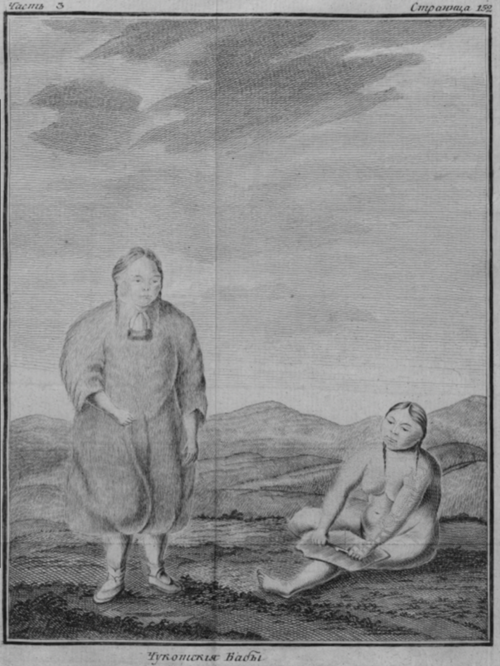Olga Trufanova (München, Regensburg), 17th Century “Gender-based Violence” and 19th Century “Intersectionality”: Discussions on “Women’s Question” in the Writings of Siberian Regionalists
Oberseminar zur Geschichte Russlands und Ostmitteleuropas in der Vormoderne
05.05.2022 14:00 Uhr – 16:00 Uhr

“Chukotskiie Baby” [women of Chukotka], from Krasheninnikov, Stepan “Opisaniie Zemli Kamchatki”, SPb, 1755 (pp. 152-153).
“During its colonizing movement into Siberia in XVI and XVII centuries, the Russian population surely brought [to Siberia] all customs and mores of ancient Rus’, with all roughness of that time […]. It is clear that […] the people indulged to their lower instincts in family and home life […]. The cruelest oppression, in all its inhuman form, became a fatal lot of a foreign [indigenous] woman”.
(Nikolai Iadrintsev, “Women in Siberia in XVII and XVIII centuries”)
The article “Women in Siberia in XVII and XVIII centuries” written in 1867 by Nikolai Iadrintsev became one of the first scientific texts to discuss a highly sensitive subject – violence of Russian colonizers in Siberia towards indigenous and Russian women. Relying on archival materials, Iadrintsev cites cases of women being enslaved, rented or bailed out, of prostitution and pedophilia.
Iadrinstev was not alone in his courage to discuss such a problematic topic. His contemporaries, including A.P. Schapov and S.S. Shashkov, devoted several works to the so-called “women’s question” in the history of the Russian colonization of Siberia. Although all three authors belonged to the same movement – Siberian regionalism – their approach to the subject varied greatly. Yet, what all these texts had in common is their attention to the so far silenced subject of gender- and race-based violence, and the symbolic role with which the treatment of a(n indigenous) woman was imbued.
This talk strives to (re)examine and (re)evaluate the selected texts of regionalists about the “women’s question” in Siberia. It will be examined how the authors describe and explain violence against women in Siberia. Thereby particular attention will be paid to the vocabulary the authors employ, and the discourses and ethos that result from it. The guiding questions here will be: can we speak about “intersectionality” of regionalists? What are the discursive expressions of “intersectionality” and “gender-based violence” in regionalists writings?
In a second step the chosen texts will be placed in a wider intellectual and political context of Russian empire in the second half of the XIX century. This contextualization will help answer the questions why this topic gained such popularity in regionalists’ texts, as well as what contemporary actors, events and social phenomena they implicitly criticized.
Die Veranstaltung wird über Zoom abgehalten.
Anmeldung bei Leonie Zinth L.Zinth@campus.lmu.de

